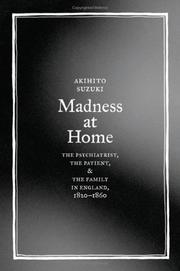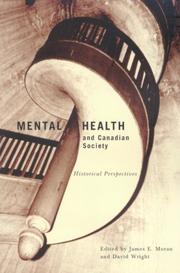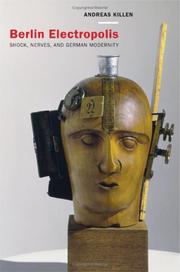| Listing 1 - 7 of 7 |
Sort by
|

ISBN: 1403934452 1349517186 9786610861699 128086169X 0230209491 9781403934451 Year: 2006 Volume: *1
Abstract | Keywords | Export | Availability | Bookmark
 Loading...
Loading...Choose an application
- Reference Manager
- EndNote
- RefWorks (Direct export to RefWorks)
Anesthesia --- Anesthesiology --- History, 19th Century --- History --- history --- Great Britain --- 19th century --- Anaesthesia --- Analgesia --- 19th Cent. History (Medicine) --- 19th Cent. History of Medicine --- 19th Cent. Medicine --- Historical Events, 19th Century --- History of Medicine, 19th Cent. --- History, Nineteenth Century --- Medical History, 19th Cent. --- Medicine, 19th Cent. --- 19th Century History --- 19th Cent. Histories (Medicine) --- 19th Century Histories --- Cent. Histories, 19th (Medicine) --- Cent. History, 19th (Medicine) --- Century Histories, 19th --- Century Histories, Nineteenth --- Century History, 19th --- Century History, Nineteenth --- Histories, 19th Cent. (Medicine) --- Histories, 19th Century --- Histories, Nineteenth Century --- History, 19th Cent. (Medicine) --- Nineteenth Century Histories --- Nineteenth Century History --- Anaesthesiology --- Surgery --- Great Britain. --- Isle of Man

ISBN: 0791482065 1429411759 9781429411752 0791466795 9780791466797 9780791482063 Year: 2006 Publisher: Albany : State University of New York Press,
Abstract | Keywords | Export | Availability | Bookmark
 Loading...
Loading...Choose an application
- Reference Manager
- EndNote
- RefWorks (Direct export to RefWorks)
Nervous Conditions explores the role of the body in the development of modern science, challenging the myth that modern science is built on a bedrock of objectivity and confident empiricism. In this fascinating look into the private world of British natural philosophers—including John Dalton, Lord Kelvin, Charles Babbage, John Herschel, and many others—Elizabeth Green Musselman shows how the internal workings of their bodies played an important part in the sciences' movement to the center of modern life, and how a scientific community and a nation struggled their way into existence.Many of these natural philosophers endured serious nervous difficulties, particularly vision problems. They turned these weaknesses into strengths, however, by claiming that their well-disciplined mental skills enabled them to transcend their bodily frailties. Their adeptness at transcendence, they asserted, explained why men of science belonged at the heart of modern life, and qualified them to address such problems as unifying the British provinces into one nation, managing the industrial workplace, and accommodating religious plurality.
Science --- History, 19th Century --- Nervous System Diseases --- Nervous system --- Scientists --- Organs (Anatomy) --- Neurosciences --- Professional employees --- Sciences --- Nervous System Disorders --- Neurological Disorders --- Neurologic Disorders --- Disease, Nervous System --- Diseases, Nervous System --- Disorder, Nervous System --- Disorder, Neurologic --- Disorder, Neurological --- Disorders, Nervous System --- Disorders, Neurologic --- Disorders, Neurological --- Nervous System Disease --- Nervous System Disorder --- Neurologic Disorder --- Neurological Disorder --- Neurology --- 19th Cent. History (Medicine) --- 19th Cent. History of Medicine --- 19th Cent. Medicine --- Historical Events, 19th Century --- History of Medicine, 19th Cent. --- History, Nineteenth Century --- Medical History, 19th Cent. --- Medicine, 19th Cent. --- 19th Century History --- 19th Cent. Histories (Medicine) --- 19th Century Histories --- Cent. Histories, 19th (Medicine) --- Cent. History, 19th (Medicine) --- Century Histories, 19th --- Century Histories, Nineteenth --- Century History, 19th --- Century History, Nineteenth --- Histories, 19th Cent. (Medicine) --- Histories, 19th Century --- Histories, Nineteenth Century --- History, 19th Cent. (Medicine) --- Nineteenth Century Histories --- Nineteenth Century History --- history --- Philosophy --- History --- Mental health

ISBN: 1282358839 9786612358838 0520932218 1598759310 9780520932210 1423745485 9781423745488 9781598759310 9780520245808 0520245806 9781282358836 6612358831 Year: 2006 Publisher: Berkeley : University of California Press,
Abstract | Keywords | Export | Availability | Bookmark
 Loading...
Loading...Choose an application
- Reference Manager
- EndNote
- RefWorks (Direct export to RefWorks)
The history of psychiatric institutions and the psychiatric profession is by now familiar: asylums multiplied in nineteenth-century England and psychiatry established itself as a medical specialty around the same time. We are, however, largely ignorant about madness at home in this key period: what were the family's attitudes toward its insane member, what were patient's lives like when they remained at home? Until now, most accounts have suggested that the family and community gradually abdicated responsibility for taking care of mentally ill members to the doctors who ran the asylums. However, this provocatively argued study, painting a fascinating picture of how families viewed and managed madness, suggests that the family actually played a critical role in caring for the insane and in the development of psychiatry itself. Akihito Suzuki's richly detailed social history includes several fascinating case histories, looks closely at little studied source material including press reports of formal legal declarations of insanity, or Commissions of Lunacy, and also provides an illuminating historical perspective on our own day and age, when the mentally ill are mainly treated in home and community.
Mental Disorders --- History, 19th Century. --- Psychiatry --- England. --- Mental health laws --- Mentally ill --- Medicine and psychology --- Mental health --- Psychology, Pathological --- Law and mental illness --- Mental disability law --- Mental illness --- Mental illness and law --- People with mental disabilities --- Insane --- Mental patients --- Mentally disordered --- Sick --- 19th Cent. History (Medicine) --- 19th Cent. History of Medicine --- 19th Cent. Medicine --- Historical Events, 19th Century --- History of Medicine, 19th Cent. --- History, Nineteenth Century --- Medical History, 19th Cent. --- Medicine, 19th Cent. --- 19th Century History --- 19th Cent. Histories (Medicine) --- 19th Century Histories --- Cent. Histories, 19th (Medicine) --- Cent. History, 19th (Medicine) --- Century Histories, 19th --- Century Histories, Nineteenth --- Century History, 19th --- Century History, Nineteenth --- Histories, 19th Cent. (Medicine) --- Histories, 19th Century --- Histories, Nineteenth Century --- History, 19th Cent. (Medicine) --- Nineteenth Century Histories --- Nineteenth Century History --- history. --- History --- Family relationships --- Home care --- Care --- Law and legislation --- Legal status, laws, etc. --- Patients --- History of human medicine --- History of the United Kingdom and Ireland --- anno 1800-1899 --- asylum. --- caregiver. --- commission of lunacy. --- disability. --- english madness. --- family. --- history of madness. --- history of medicine. --- home health care. --- insanity. --- lunacy. --- madman. --- madness. --- madwoman. --- medical specialty. --- mental disability. --- mental health. --- mental hospital. --- mental illness. --- nonfiction. --- psychiatric institutions. --- psychiatric profession. --- psychiatry. --- psychology. --- social history.

ISBN: 1281244252 9786611244255 0813542383 9780813542386 9781281244253 0813539005 9780813539003 0813539013 9780813539010 6611244255 Year: 2006 Publisher: New Brunswick, N.J. : Rutgers University Press,
Abstract | Keywords | Export | Availability | Bookmark
 Loading...
Loading...Choose an application
- Reference Manager
- EndNote
- RefWorks (Direct export to RefWorks)
The history of medicine is much more than the story of doctors, nurses, and hospitals. Seeking to understand the patient’s perspective, historians scour the archives, searching for rare personal accounts. Bringing together a trove of more than 400 family letters by Charles Dwight Willard, Suffering in the Land of Sunshine provides a unique window into the experience of sickness. A Los Angeles civic leader at the turn of the twentieth century, Willard is well known to historians of the West, but exclusively for his public life as a booster and reformer. Willard’s evocative story offers fresh insights into several critical issues, including how concepts of gender, class, and race shape patients’ representations of their illness, how expectations of cure affect the illness experience, how different cultures constrain the coping strategies of the sick, and why robust health is such an exalted value in certain societies.
Tuberculosis --- Tuberculosis, Pulmonary --- Tuberculosis, Pulmonary. --- History, 20th Century. --- History, 19th Century. --- Consumption (Disease) --- Lungs --- Phthisis --- Pulmonary tuberculosis --- TB (Disease) --- Chest --- Mycobacterial diseases --- Mycobacterium tuberculosis --- 19th Cent. History (Medicine) --- 19th Cent. History of Medicine --- 19th Cent. Medicine --- Historical Events, 19th Century --- History of Medicine, 19th Cent. --- History, Nineteenth Century --- Medical History, 19th Cent. --- Medicine, 19th Cent. --- 19th Century History --- 19th Cent. Histories (Medicine) --- 19th Century Histories --- Cent. Histories, 19th (Medicine) --- Cent. History, 19th (Medicine) --- Century Histories, 19th --- Century Histories, Nineteenth --- Century History, 19th --- Century History, Nineteenth --- Histories, 19th Cent. (Medicine) --- Histories, 19th Century --- Histories, Nineteenth Century --- History, 19th Cent. (Medicine) --- Nineteenth Century Histories --- Nineteenth Century History --- 20th Cent. History (Medicine) --- 20th Cent. History of Medicine --- 20th Cent. Medicine --- Historical Events, 20th Century --- History of Medicine, 20th Cent. --- History, Twentieth Century --- Medical History, 20th Cent. --- Medicine, 20th Cent. --- 20th Century History --- 20th Cent. Histories (Medicine) --- 20th Century Histories --- Cent. Histories, 20th (Medicine) --- Cent. History, 20th (Medicine) --- Century Histories, 20th --- Century Histories, Twentieth --- Century History, 20th --- Century History, Twentieth --- Histories, 20th Cent. (Medicine) --- Histories, 20th Century --- Histories, Twentieth Century --- History, 20th Cent. (Medicine) --- Twentieth Century Histories --- Twentieth Century History --- Pulmonary Tuberculoses --- Pulmonary Tuberculosis --- Tuberculoses, Pulmonary --- Pulmonary Consumption --- Pulmonary Phthisis --- Consumption, Pulmonary --- Consumptions, Pulmonary --- Phthises, Pulmonary --- Phthisis, Pulmonary --- Pulmonary Consumptions --- Pulmonary Phthises --- Patients --- history. --- Diseases --- Willard, Charles Dwight, --- Los Angeles.

ISBN: 1282866982 9786612866982 0773576541 9780773576544 0773531319 9780773531314 9780773531390 0773531394 9781282866980 6612866985 Year: 2006 Publisher: Montreal ; Ithaca : McGill-Queen's University Press,
Abstract | Keywords | Export | Availability | Bookmark
 Loading...
Loading...Choose an application
- Reference Manager
- EndNote
- RefWorks (Direct export to RefWorks)
In Mental Health and Canadian Society leading researchers challenge generalisations about the mentally ill and the history of mental health in Canada. Considering the period from colonialism to the present, they examine such issues as the rise of the insanity plea, the Victorian asylum as a tourist attraction, the treatment of First Nations people in western mental hospitals, and post-World War II psychiatric research into LSD.
Mental illness --- Psychiatry --- Psychiatric hospitals --- Mental Disorders --- History, 19th century. --- History, 20th century. --- Hospitals, Psychiatric --- 20th Cent. History (Medicine) --- 20th Cent. History of Medicine --- 20th Cent. Medicine --- Historical Events, 20th Century --- History of Medicine, 20th Cent. --- History, Twentieth Century --- Medical History, 20th Cent. --- Medicine, 20th Cent. --- 20th Century History --- 20th Cent. Histories (Medicine) --- 20th Century Histories --- Cent. Histories, 20th (Medicine) --- Cent. History, 20th (Medicine) --- Century Histories, 20th --- Century Histories, Twentieth --- Century History, 20th --- Century History, Twentieth --- Histories, 20th Cent. (Medicine) --- Histories, 20th Century --- Histories, Twentieth Century --- History, 20th Cent. (Medicine) --- Twentieth Century Histories --- Twentieth Century History --- 19th Cent. History (Medicine) --- 19th Cent. History of Medicine --- 19th Cent. Medicine --- Historical Events, 19th Century --- History of Medicine, 19th Cent. --- History, Nineteenth Century --- Medical History, 19th Cent. --- Medicine, 19th Cent. --- 19th Century History --- 19th Cent. Histories (Medicine) --- 19th Century Histories --- Cent. Histories, 19th (Medicine) --- Cent. History, 19th (Medicine) --- Century Histories, 19th --- Century Histories, Nineteenth --- Century History, 19th --- Century History, Nineteenth --- Histories, 19th Cent. (Medicine) --- Histories, 19th Century --- Histories, Nineteenth Century --- History, 19th Cent. (Medicine) --- Nineteenth Century Histories --- Nineteenth Century History --- Hospitals --- Insane asylums --- Mental hospitals --- Mental institutions --- Mentally ill --- Psychiatry in general hospitals --- Asylums --- Mental health facilities --- Specialty hospitals --- Medicine and psychology --- Mental health --- Psychology, Pathological --- Madness --- Mental diseases --- Mental disorders --- Disabilities --- History. --- history. --- Psychiatric services --- Canada. --- History, 19th Century --- History, 20th Century --- Maladies mentales --- Psychiatrie --- Hôpitaux psychiatriques --- history --- Histoire

ISBN: 0801443504 080147356X 9780801443503 9780801473562 Year: 2006 Publisher: Ithaca Cornell University Press
Abstract | Keywords | Export | Availability | Bookmark
 Loading...
Loading...Choose an application
- Reference Manager
- EndNote
- RefWorks (Direct export to RefWorks)
Deaf --- Group identity --- Japanese Sign Language --- History. --- Persons With Hearing Impairments --- Deafness --- Sign Language --- Social Identification --- History, 19th Century --- History, 20th Century --- History --- history --- ethnology --- Japan. --- Bonin Islands --- 20th Cent. History (Medicine) --- 20th Cent. History of Medicine --- 20th Cent. Medicine --- Historical Events, 20th Century --- History of Medicine, 20th Cent. --- History, Twentieth Century --- Medical History, 20th Cent. --- Medicine, 20th Cent. --- 20th Century History --- 20th Cent. Histories (Medicine) --- 20th Century Histories --- Cent. Histories, 20th (Medicine) --- Cent. History, 20th (Medicine) --- Century Histories, 20th --- Century Histories, Twentieth --- Century History, 20th --- Century History, Twentieth --- Histories, 20th Cent. (Medicine) --- Histories, 20th Century --- Histories, Twentieth Century --- History, 20th Cent. (Medicine) --- Twentieth Century Histories --- Twentieth Century History --- 19th Cent. History (Medicine) --- 19th Cent. History of Medicine --- 19th Cent. Medicine --- Historical Events, 19th Century --- History of Medicine, 19th Cent. --- History, Nineteenth Century --- Medical History, 19th Cent. --- Medicine, 19th Cent. --- 19th Century History --- 19th Cent. Histories (Medicine) --- 19th Century Histories --- Cent. Histories, 19th (Medicine) --- Cent. History, 19th (Medicine) --- Century Histories, 19th --- Century Histories, Nineteenth --- Century History, 19th --- Century History, Nineteenth --- Histories, 19th Cent. (Medicine) --- Histories, 19th Century --- Histories, Nineteenth Century --- History, 19th Cent. (Medicine) --- Nineteenth Century Histories --- Nineteenth Century History --- Social Identity --- Group Identification --- Identification, Social --- Group Identifications --- Identification, Group --- Identifications, Group --- Identifications, Social --- Identities, Social --- Identity, Social --- Social Identifications --- Social Identities --- Language, Sign --- Languages, Sign --- Sign Languages --- Language --- Collective identity --- Community identity --- Cultural identity --- Social identity --- Identity (Psychology) --- Social psychology --- Collective memory --- Nihongo shuwa --- Sign language --- Deaf-mutes --- Deaf people --- Hearing impaired --- Deafblind people --- Patients --- J4221 --- J5080 --- J4127 --- Japan: Sociology and anthropology -- social policy and pathology -- handicapped and disabled --- Japan: Language -- dialects and variation -- sign language --- Japan: Sociology and anthropology -- social identity and self --- Professional Identification --- Professional Identity Formation --- Formation, Professional Identity --- Formations, Professional Identity --- Identification, Professional --- Identifications, Professional --- Identity Formation, Professional --- Identity Formations, Professional --- Professional Identifications --- Professional Identity Formations

ISBN: 1282759329 9786612759321 0520931637 1598757814 9780520931633 1423727614 9781423727613 9781598757811 9780520243620 0520243625 9781282759329 6612759321 Year: 2006 Publisher: Berkeley : University of California Press,
Abstract | Keywords | Export | Availability | Bookmark
 Loading...
Loading...Choose an application
- Reference Manager
- EndNote
- RefWorks (Direct export to RefWorks)
Berlin Electropolis ties the German discourse on nervousness in the late nineteenth and early twentieth centuries to Berlin's transformation into a capital of the second industrial revolution. Focusing on three key groups-railway personnel, soldiers, and telephone operators-Andreas Killen traces the emergence in the 1880's and then later decline of the belief that modernity caused nervous illness. During this period, Killen explains, Berlin became arguably the most advanced metropolis in Europe. A host of changes, many associated with breakthroughs in technologies of transportation, communication, and leisure, combined to radically alter the shape and tempo of everyday life in Berlin. The resulting consciousness of accelerated social change and the shocks and afflictions that accompanied it found their consummate expression in the discourse about nervousness. Wonderfully researched and clearly written, this book offers a wealth of new insights into the nature of the modern metropolis, the psychological aftermath of World War I, and the operations of the German welfare state. Killen also explores cultural attitudes toward electricity, the evolution of psychiatric thought and practice, and the status of women workers in Germany's rapidly industrializing economy. Ultimately, he argues that the backlash against the welfare state that occurred during the late Weimar Republic brought about the final decoupling of modernity and nervous illness.
Social Change --- Psychiatry --- Mental Fatigue --- History, 20th Century. --- History, 19th Century. --- Electroconvulsive Therapy --- Anxiety --- Neurasthenia --- Soldiers --- Telephone operators --- Railroads --- Social change --- Industrialization --- Electrification --- Electrotherapeutics --- Mental fatigue --- Medicine and psychology --- Mental health --- Psychology, Pathological --- Armed Forces personnel --- Members of the Armed Forces --- Military personnel --- Military service members --- Service members --- Servicemen, Military --- Armed Forces --- Telephone companies --- Iron horses (Railroads) --- Lines, Railroad --- Rail industry --- Rail lines --- Rail transportation --- Railroad industry --- Railroad lines --- Railroad transportation --- Railway industry --- Railways --- Communication and traffic --- Concessions --- Public utilities --- Transportation --- Trusts, Industrial --- Change, Social --- Cultural change --- Cultural transformation --- Societal change --- Socio-cultural change --- Social history --- Social evolution --- Electric power distribution --- Electric power production --- Electrotherapy --- Faradization --- Electricity in medicine --- Electrostatics --- Physical therapy --- Therapeutics, Physiological --- Neural stimulation --- Fatigue, Mental --- Intellectual fatigue --- Mental exhaustion --- Mental overwork --- Overwork, Mental --- Fatigue --- Breakdown, Nervous --- Exhaustion, Nervous --- Nervous breakdown --- Nervous exhaustion --- Nervous prostration --- Neurasthenic neuroses --- Prostration, Nervous --- Asthenia --- Somatoform disorders --- Industrial development --- Economic development --- Economic policy --- Deindustrialization --- 19th Cent. History (Medicine) --- 19th Cent. History of Medicine --- 19th Cent. Medicine --- Historical Events, 19th Century --- History of Medicine, 19th Cent. --- History, Nineteenth Century --- Medical History, 19th Cent. --- Medicine, 19th Cent. --- 19th Century History --- 19th Cent. Histories (Medicine) --- 19th Century Histories --- Cent. Histories, 19th (Medicine) --- Cent. History, 19th (Medicine) --- Century Histories, 19th --- Century Histories, Nineteenth --- Century History, 19th --- Century History, Nineteenth --- Histories, 19th Cent. (Medicine) --- Histories, 19th Century --- Histories, Nineteenth Century --- History, 19th Cent. (Medicine) --- Nineteenth Century Histories --- Nineteenth Century History --- 20th Cent. History (Medicine) --- 20th Cent. History of Medicine --- 20th Cent. Medicine --- Historical Events, 20th Century --- History of Medicine, 20th Cent. --- History, Twentieth Century --- Medical History, 20th Cent. --- Medicine, 20th Cent. --- 20th Century History --- 20th Cent. Histories (Medicine) --- 20th Century Histories --- Cent. Histories, 20th (Medicine) --- Cent. History, 20th (Medicine) --- Century Histories, 20th --- Century Histories, Twentieth --- Century History, 20th --- Century History, Twentieth --- Histories, 20th Cent. (Medicine) --- Histories, 20th Century --- Histories, Twentieth Century --- History, 20th Cent. (Medicine) --- Twentieth Century Histories --- Twentieth Century History --- history. --- therapy. --- History. --- Employees --- Psychological aspects. --- Social aspects --- Germany. --- berlin. --- brain. --- electricity. --- europe. --- factory workers. --- german history. --- german. --- germany. --- great war. --- history of medicine. --- industrial revolution. --- insanity. --- labor. --- lunacy. --- madness. --- manichean teleology. --- medical community. --- metropolis. --- modernity. --- nervous disorders. --- nervous illness. --- nervousness. --- nonfiction. --- psyche. --- psychiatry. --- psychology. --- ptsd. --- railways. --- science. --- shell shock. --- social change. --- technology. --- telephone operators. --- trauma. --- veterans. --- weimar republic. --- welfare state. --- women workers. --- world war one. --- ww1.
| Listing 1 - 7 of 7 |
Sort by
|

 Search
Search Feedback
Feedback About UniCat
About UniCat  Help
Help News
News